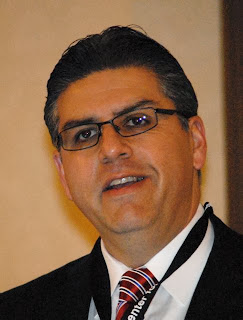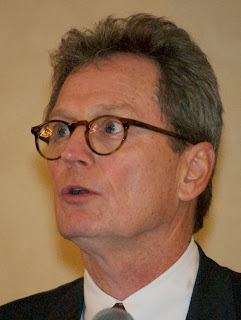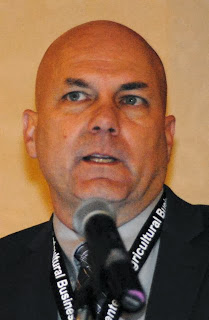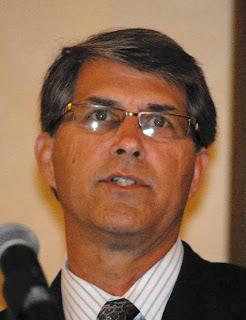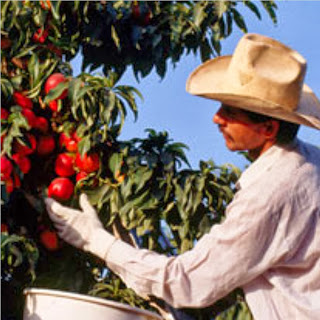32ND AGRIBUSINESS CONFERENCE
Economy, Water, Trade and Labor were Big Topics at 32nd Agribusiness Conference
By Patrick Cavanaugh, Editor
The reality of the 2014 Federal water allocation, new trade agreements, and the prospects of immigration reform were some of the topics discussed at the 32nd Agribusiness Management Conference, held at the Radisson Hotel and Conference Center in Fresno, and hosted by Mechel Paggi, Director of California State University Center for Agricultural Business.
California State University, Fresno (CSUF) President Joseph Castro, the first CSUF president native to the Central Valley and close to agriculture, opened the conference. “I’m happy that our Jordon College of Agricultural Sciences and Technology has had such a tremendous impact in helping to provide a well-educated work force to serve the many facets of the agricultural industry in the valley and beyond.
Following Castro, Terry Barr, Chief Economist, CoBank, presented an economic outlook. He noted that economic decisions are not being made fast enough, because the economy is about the same as it was a year ago. “There are still many issues that are unresolved,” he said, adding, “If you don’t make decisions then you don’t move forward.”
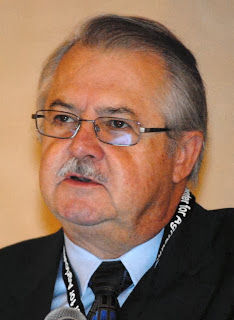
Terry Barr, chief economist, CoBank
“We have been through a very dynamic period over the last 10 years. In the first half of that 10 year period, everyone was talking about the rising middle class in China and India and what it was doing for agricultural product demand,” said Carr. “From 2004 to 2008, we had the best of all possible worlds with strong economic growth and growth in the middle class. That was an extremely strong time for agricultural exports. In late 2008, we experienced different economic turmoil and global recession; however, agriculture was pretty well insulated,” Carr added.
“Today, demand for agricultural products remains very strong, mainly due to global shortfalls of some commodities and, of course, growth in China. Going forward in the next five years, we expect a period of continued turmoil, requiring policy changes to realign management, including budget deficits,” noted Carr.
“China is still going to be important but there will be some major geopolitical realignments globally. We are not going to see rapid growth with solid demand. As we go forward, agriculture will probably have to find the new normal,” he said.
“In the US, there is a lot of policy inaction, and there is no long term strategy to reduce the debt. The US dollar is important to agriculture in terms of our competiveness on a global basis,” Carr explained. “From 2002 to 2011, the US dollar fell in value by 38 percent, and our global competitiveness was extremely strong during that time. But we have to believe that the dollar is going to get stronger, not weaker, against most other currencies, with the exception of China.”
Carr noted that China is really driving the global economy at this point in time and what happens there has extraordinary influence on Ag pricing in the future. “They have a lot of room for stimulus, and they have $3 trillion in reserves that they are deploying both domestic and globally,” he said.
Paggi then spoke about two trade agreements that are on currently in the forefront, the Trans-Pacific Partnership (TPP) and the Transatlantic Trade and Investment Partnership (TTIP).
“Basically every commodity we work with in California, particularly from the Central Valley, has a huge stake in the export market,” said Paggi. “We produce about $44 billion worth of product and 38 percent of it moves into international trade. It’s tremendously important to us,” said Paggi.
“TTP and TTIP are the two most important preferential trade agreements to be negotiated since NAFTA,” he noted.
“Our TPP partners encompass a market of nearly 500 million consumers with a combined GDP of nearly $12 trillion,” Paggi said. Partner countries include Canada, Australia, Mexico, Malaysia, Singapore, Chile, Peru, New Zealand, Vietnam, Brunei and Japan.
“The TTIP with the EU spans 28 countries with more than 500 million consumers and a GDP of $16.5 trillion,” said Paggi.
“These agreements would give us more marketing opportunities, which at the present time are less than completely open to us, so the benefits would have tremendous potential for us,” Paggi explained.
Paggi said that there is tremendous debate on these potential agreements within the U.S. Also, farmers in the foreign countries involved are worried about opening up their market to U.S. imports.
These agreements would also help to strengthen the existing trade agreements that already are in place with many of the countries in the area.
Paggi said, in summary, the U.S. has a choice to remain engaged or be left behind. None of these agreements or policy solutions is perfect, so there will have to be a pro-con compromise.
“Also, keep in mind,” Paggi continued, “that trade agreements promote economic well-being, and economic stability promotes political stability, so the benefits of these agreements often transcend simple market access and sales opportunities.”
Tom Birmingham is General Manager of Westlands Water District, an agency of 615,000 acres on the west side of the San Joaquin Valley in Fresno and Kings Counties. “We are here to talk about ‘What’s on tap,’ which is a metaphor that creates an image I wish were applicable on the west side of the San Joaquin Valley,” Birmingham began, “I am not just talking about the Westlands Water District, I am talking about the west side of the San Joaquin Valley that includes the service of every agency that has an agricultural contract with the U.S.”
“Unfortunately, and it almost brings tears to my eyes, next year, when the farmers in the Federal Water districts that use water from the Central Valley Project they open their taps, nothing is going to come. Nothing, that is, unless we have a dramatic change in the hydrology that we have been experiencing over the last year, actually the last eight months,” Birmingham warned.
“In California, water years fall in one of five classifications of hydrology; they have been classified as wet, above normal, below normal, dry or critical. If you talk about average hydrology in California, average rain, average snowpack, average runoff, it doesn’t mean a lot,” said Birmingham. “Because in fact, what is considered to be an average year, falls into a classification that is called, ‘a below-normal water year,’” he noted.
Birmingham continued, “But Westlands is projecting, and these are projections that the Bureau of Reclamation doesn’t take any issue with, that if we have average precipitation or hydrology for the rest of this water year, plus the same operational constraints the Endangered Species Act imposed in 2013 on the state water project and the Federal Central Valley project, our water supply will initially be zero. If we are lucky, we might get to 5% or 10% of our water supply.”
“So, we are facing a repeat of what we saw in 2009,” he noted, “when nearly half of the bare ground lay fallow in the Westlands Water District; where farmers over drafted the groundwater basin; where we experienced incredible unemployment; where people were forced to stand in lines to receive food, in some cases getting to the front of the line to be told the food bank had run out of food, or to get to the front of the line and be given carrots – grown in China. That, in my perspective, is a tragedy; it is unconscionable,” explained Birmingham.
“The bad news is that in Kern County or the Friant-Kern service area, farmers and the Westside of the San Joaquin Valley, where groundwater is available, growers have been over drafting the groundwater basin,” said Birmingham.
“Westlands has one of the most sophisticated groundwater management programs that exist in the state,” explained Birmingham. “In fact, in 2009, when the state legislature adopted statutes requiring the development of groundwater management plans, Westlands was actually used as one of the examples of the types of information that could be collected.
But Westlands is projecting that in 2013, farmers in the district will use 598,000 acre feet of groundwater from the groundwater basin, compared to a safe yield of approximately 150,000 acre feet.
“The last time farmers in Westlands Water District extracted that much groundwater was in 1992, the fifth year of an extended drought,” said Birmingham.
“We have talked about subsidence and how it has historically occurred, and we are beginning to experience it in numerous places north of Fresno, Madera and Merced Counties,” he said.
“We will continue to experience subsidence, but the rate of subsidence will accelerate. Currently the groundwater levels in Westlands are approximately 100 feet higher than in 1967 when deliveries from the Central Valley Project began. When we fall below that historic low groundwater level, we’re going to experience the types of subsidence that led to the authorization of the San Luis unit.
“Congress authorized construction of San Luis to alleviate subsidence on the Westside of the San Joaquin Valley,” said Birmingham.
“One of the things on tap is there is going to be some type of groundwater regulation. California is one of the few states that generally does not regulate the use of groundwater,” he noted.
There is a lot of groundwater monitoring in California, and in a few regions there are special groundwater management districts created by the legislature. But, generally the use of groundwater is not regulated to the same degree as surface water.
“There exists a lack of statewide effort to regulate the use of groundwater. I would suspect that all of our agencies would oppose that type of statewide legislation,” said Birmingham. “From our perspective, regulations should be made at a regional level because every groundwater basin is different and should be managed on a case-by- case basis instead of state-wide regulations.”
“But it is interesting, half of the farmers in the Westlands Water District take the historic agricultural position that groundwater is the resource available to overlying landowners, and no one has any business regulating their groundwater,” he said.
“If the other 50% of farmers in Westlands, do not become proactive in its management of ground water, as opposed to its monitoring, then the state will step in and do it on behalf of everyone in the state,” said Birmingham.
“Equally as controversial, if management is not done by regional entities like Westlands Water District, it will be regulated by county or state.”
“So, Westlands Water District is actively looking to get into the business of regulating the use of groundwater.”
There is some good news, tempered with bad news. The good news is there are a lot of resources that can be reasonably and more effectively and efficiently managed.
Westlands Water District has experienced chronic water supply shortages on a regular basis since the implementation of the Endangered Species Act, and has coped using water transfer contracts based annually or on a longer-term basis with a fixed price.
Also speaking about water was Ron Jacobsma, General Manager, Friant Water Authority. He gave an interesting history of the San Joaquin River, Friant Dam, Millerton Reservoir and canal that serve 1,000s of growers on the East Side of the San Joaquin Valley from Madera to Kern County.
Brent Walthall, with the Kern Water Agency, talked about the many different and historical water districts in Kern County, as well as describing the innovative water banking that is taking place in Kern County during flood years.

